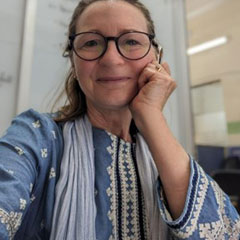Karen Coales, Doctoral Researcher and Research Associate, Department of Health Sciences
Karen is a final year doctoral researcher and research associate in the Mental Health and Addictions Group.

She is working with the DiaDeM programme which is testing the feasibility of using adapted behavioural activation to treat comorbid depression in adults with diabetes in Bangladesh and Pakistan.
Karen is an occupational therapist by background. Before joining the University of York, she worked for 20 years in the NHS and with local authorities, specialising in supporting people with long-term conditions and common mental disorders.
email: karen.coales
Our 60-second interview with Karen:
Could you please tell us what work you do in the field of mental health?
My doctoral research focuses on evaluating the impact on non-specialist health workers of using task sharing to increase access to mental health services in low-and-middle-income countries. Task sharing is a commonly used approach to bridging treatment gaps in low-resource settings and relies upon training non-specialist health workers to be able to undertake, with supervision, specific healthcare tasks which were previously the responsibility of scarce health specialists. Working with DiaDeM, I have taken a leading role in developing a culturally adapted version of Behavioural Activation, a brief behaviour change therapy used to treat depression, and writing and delivering the associated training package for non-specialist health workers in Bangladesh and Pakistan.
What do you find most rewarding and inspiring in this work?
I have been privileged to be able to visit both Bangladesh and Pakistan. Having the opportunity to work with and learn from health workers and people living with diabetes and depression in a completely different culture to my own has been an incredible and eye-opening experience.
What is the most challenging or complicated aspect of this work?
Many people living in Bangladesh and Pakistan live in challenging circumstances on very low incomes. Getting access to free or low-cost healthcare generally and mental health services in particular, can be very difficult. Mental health stigma is also a real barrier to seeking help.
What impact do you hope your work is having - or can potentially have?
If we can successfully support non-specialist health workers transitioning into mental health roles, we have the potential to help more people in low-and-middle-income countries struggling with their mental health by both increasing the mental health workforce and improving mental health literacy. This could also help to tackle mental health stigma and encourage more people to come forward for help.
Could you share with us one piece of advice that you follow for your own mental health?
Aim to do something everyday that gives you a sense of pleasure or achievement and something that connects you with other people. Don’t be afraid to step out of your comfort zone and to challenge yourself to try something new.